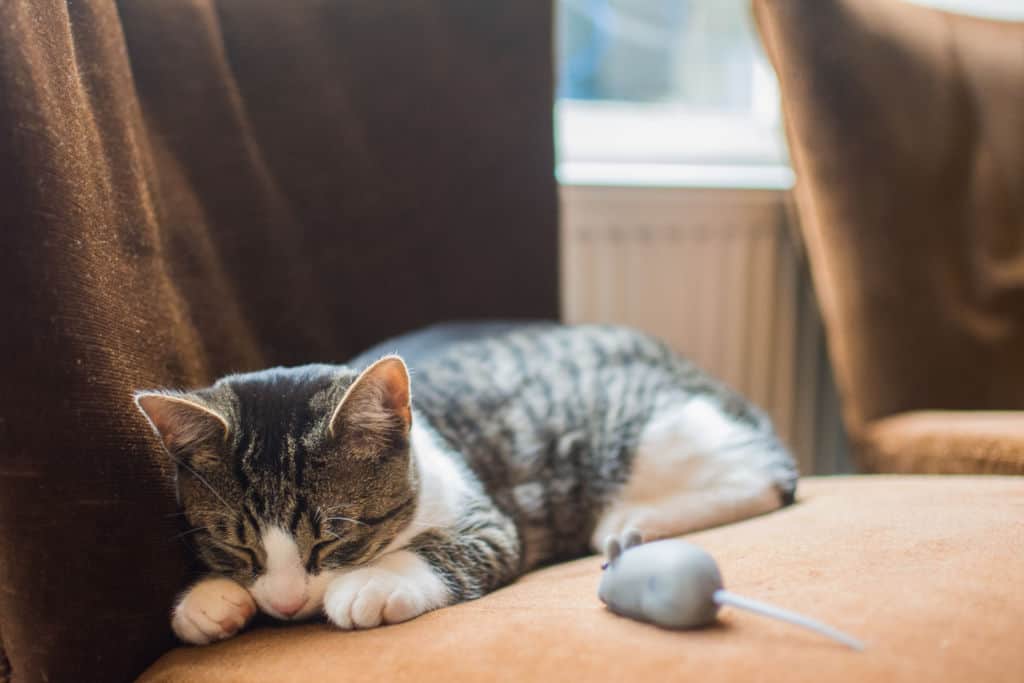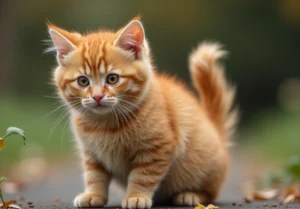While we often imagine cats as the fearless hunters of mice, this isn’t always the case. Surprisingly, some domesticated cats exhibit genuine apprehension around mice or even rats. Why does this paradox exist, and what are the intricacies of this cat-mouse relationship? Let’s dive in.

The Peculiarities of the Cat-Mouse Dynamic
Are All Cats Natural Mousers?
Not every feline lounging on our couches is a born mouse-hunter. Domestication and a life of comfort mean that while the hunting instinct exists, its application can vary greatly.
Just as humans have varied skills, cats too have their strengths, weaknesses, and preferences. Some might have the prowess of a lion when stalking a toy, while others might get startled by their own tail.
Therefore, it’s difficult to say whether your cat is a mouser without trying things out.
If you want your cat actually to do anything about mice, you need to start with a slow introduction – you must play the role of the mom-cat and demonstrate how you kill such a critter and then allow the cat to become acquainted with a dead one.
But remember that mice, rats, and other rodents frequently transmit infections that harm your cat’s health. If your cat tracks and captures a mouse in your home, it is susceptible to fleas, ticks, and other parasites.
Why Some Cats Are Scared of Mice and Rats?
Most of the time, it’s not that the cat is afraid of such creatures. They may never see one if they’ve always been in the house. If they’ve never seen one, they’re correct to be suspicious! And if the cat is fed, curiosity is the only motivation to deal with such a threat.
All those species are prey and hunted often. Even innocuous animals, such as prey, do not like being killed or assaulted and will fight back when they can. I believe these terrified cats had encountered a target that decided they did not want to be food.
Cats are known for their insatiable curiosity.
However, they have lightning-fast reflexes and frequently leap before they realize why! Especially if something resembles a snake. Cats are highly apprehensive of other creatures that could damage or kill them.
The relationship between cats and rats is more complex. A formidable rat isn’t the usual prey a cat would choose. A rat’s bite not only packs a punch but can also introduce harmful pathogens. When confronted with a decision, a smart cat may decide that tangling with a large rat isn’t worth the risk.
Practical Insights: Cats and Rodent Control
Will Adopting a Cat Solve My Mouse Problem?
Cats are an effective mice deterrent. Once mice realize a cat is nearby, they typically leave the area fast. It usually takes at least one or two stalkings, but they will usually run once they detect a cat scent.
Mice can detect the odor of cats and will avoid a home with cats if there are better options. However, your cats will only partially keep mice out. Houses offer a lot of great hiding places, they’re warm, and they’re full of food, so even if you have cats, a few mice will risk staying in your house.
Mice will avoid a competent mouser, but the cat is unlikely to be able to access the spots where they hide and nest. You must determine how they came in and close the hole. They can fit vent stacks, crawl space vents, and any other place.
Whatever you do, don’t starve your cat to catch mice unless your veterinarian recommends it.
Regarding which cat is the best for hunting mice, the cat breed is unimportant. A shelter cat who had previously lived outside is a good choice. Get two of them, but ensure you are feeding them and providing them with medical treatment rather than simply employing them to kill mice and failing to care for them properly.
For the cat’s sake, please do not allow them to eat the mice, and do not allow this behavior to continue for an extended period. Mice contain diseases that cats can contract by biting on or eating them.
Mouse-Proofing Your Home
While cat urine keeps most mice away, it also makes some mice braver and has been demonstrated not to affect their number.
Here’s a few things you can do to mouse-proof your home:
- Seal Entry Points: Mice can squeeze through surprisingly small gaps. Block any opening larger than a dime with steel wool, which they can’t chew through.
- Remove Food Sources: Ensure all food items are stored securely, away from the prying noses of rodents.
- Professional Help: When in doubt, call in experts who offer pet-friendly services to handle infestations and prevent future ones.
Can Cats Detect Mice Behind Barriers?
Absolutely! A cat’s sensory perception, especially their acute sense of hearing, is phenomenal. If your cat suddenly seems fixated on a wall or floor, they might be onto something. Trust in their instincts; they’ve been honed over millennia.
Frequently Asked Questions
Are mice and rats naturally scared of cats?
Absolutely. These rodents can recognize the sounds of their predators and often react with high-pitched warning cries to their peers.
Do mice avoid areas with a cat’s scent?
Some studies suggest that certain chemicals found in cat saliva and rat urine can repel mice. Essentially, our feline friends serve as a natural vermin deterrent.
How long will mice hide when they sense a cat nearby?
Hunger is a powerful motivator. While mice are wary of cats, the need for food can drive them to risk their lives. To them, facing a cat might be preferable to starving.
Paw-sitively Conclusive Thoughts
Ready to delve deeper into the world of cat behaviors? Embrace the feline world with all its quirks and curiosities. Whether you’re battling a mouse problem or simply trying to understand your pet better, remember: every cat is a unique universe of instincts, behaviors, and surprises.
? Next Steps:
- Explore more about cat behaviors.
- Enjoyed this read? Sign up for our newsletter for more purr-fect insights!
- Spread the feline love; share this post on social media!
Alex, a passionate animal lover, has experience in training and understanding animal behavior. As a proud pet parent to two dogs and three cats, he founded AnimalReport.net to share insights from animal experts and expand his knowledge of the animal kingdom.




